中考英语阅读理解猜测词义题答题策略
中考英语复习--阅读理解之猜测词义题
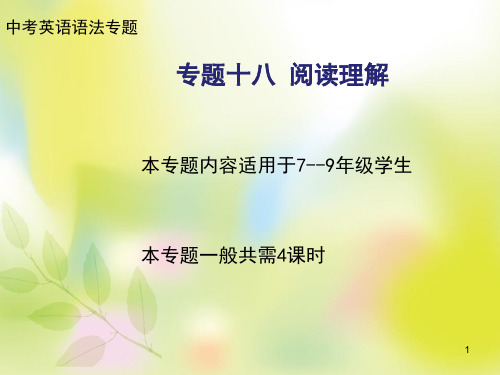
二、猜测词义题的常见的提问形式
1. The word “…” refers to / probably means/ could best be replaced by _____. 2. What do you think the expression “…” stands for? 3. The underlined sentence “…” means ______. ...... 4 By saying “……” we mean_______ 5 “……” as used in the passage, can be best defined as _______.
The word "guilty" in the third paragraph means ______.
A. unhappy B. worried C. happy D. sorry
9
2.One evening last July, my old car broke down on a highway. It was an hour before sunset, and I was 25 miles from home. I couldn't reach anyone to pick me up, so I decided to take a bus.
反义法 如 hot and cold, give and receive等,或前句为肯定,后 句为否定。总之,词与词间都起着互 为线索的作用。
释义法 对文章中的生词用定语(从 句)、表语甚至于用逗号、破折号等 标点符号引出并加以解释说明。
情景推断法、代词替代法,构词法等
3
一、做题要领
1)文中找线索或信息词; 2) 根据熟悉的词及词义判断新单词之意; 3)根据上下文判断新词汇在特定句中确切意思。
中考英语复习阅读理解五大题型解题方法:阅读理解词义猜测

中考英语复习阅读理解五大题型解题方法:阅读理解词义猜测二、考点热点回顾技能训练-猜测词义题1、题型分析:在做阅读理解题时,常会遇到一些过去未曾见过的生词,这类生词的词义许多是可以上下文信息推断出来的,在一些文章中,有时作者在使用一个生词之后,会对该词的含义作一些解释说明;有时作者为了相反的两件事或人,会使用一些反义词或表示反义关系的词语来进行对比;有时作者为避免重复,或为了表达同一事物的不同种类,还会使用同义词或近义词。
2、解题思路与技巧能根据上、下文正确判断灵活变化的词义,才算是真正具备了一定的阅读能力,这种不使用词典而通过上、下文语境来认识生词的能力,是我们学生必备的能力。
一般来说,推测词义的题目中所出现的单词,绝大多数的词学生过去没有见过,这就需要我们在该词出现的不同的上下文中去搜索线索,通过上、下文,就能帮助我们初步断定该词在文中的真正含义。
然后将这个释义带到文中,检查其释义是否贴切,所以,我们见到这种题型不要慌张,要将该词所出现的情景,根据上、下文仔细比较,从中得到该词的确切含义。
二、经典例题(一)Go and watch the baby when he is asleep, see how his chest rises and falls, then rises and falls again.He does not know what he is doing, but he breathes as well as the oldest and cleverest man in the world. He began to breathe when he was born, and he will not stop until he dies, still he does it without thinking about it.See how long you can hold your breath.In some places men dive in the sea for pearls. They pick up shells that hold the pearls, and the longer they stay under water the more pearls they can find. For the reason(原因)they hold their breath for a long time.Watch do see how many times a man draws his breath every minute. Some men breathe fifteen times a minute. An elephant breathes only eight times. It was told that a mouse breathes a hundred and twenty times each minute.No one needs to tell us that what we breathe every minute of every day is air. It is around us everywhere, like wonder sea that we can not see.The word “It” in the last paragraph means .A. wonderful seaB. airC. a mouseD. an elephant(二)Australia nearly as large as the United States, but most of it is too dry for people to live in. Around this dry part are large sheep and cow farms. A few of them are as large as the smallest state (州)in America. Often the nearest neighbours are several hundred kilometres away.The two-day radio is very important to people who live in these great Australia farms. It works much like a telephone A person can listen to someone else talk and then give an answer. For example, people on the large farms could talk to a doctor far away. They could tell the doctor about someone who was ill, and the doctor could let them know how to look after sick person. As the large farms were so far from towns, the children could not go to school. Radio schools were started for them in some places. At a certain(某一)time each day, boys and girls turn on their radios and listen to teachers in cities far away.Families on the large farms wanted to give news to their neighbours. The programme “Round Robin” talks by radio were started to keep families in touch with(保持联系)each other. They could talk about who was going away and who was ill. The men could talk about their sheep and cows and how much money the markets would pay for them. In many ways the radio became a newspaper for the farm people of Australia.The word “sick” in the second paragraph means .A. illB. poorC. kindD. healthy三、过手训练AThe world itself is becoming much smaller by using modern traffic and modern communication means(通信设备). Life today is much easier than it was hundreds of years ago, but it has brought new problems. One of the biggest problems is pollution(污染). To pollute means to make things dirty. Pollution comes in many ways. We see it, smell it, drink it and even hear it. Man has been polluting the earth. The more people, the more pollution. Many years ago, the problem was not so serious because there were not so many people. When the land was used up or the river was dirty in one place, man moved to another place. But this is no longer true. Man is now slowly polluting the whole world.Air pollution is still the most serious. It’s bad for all living things in the world, but it is not the only one kind of pollution. Water pollution kills our fish and pollutes our drinking water. Noise pollution makes us angry more easily.Many countries are making rules(法规)to fight pollution. They stop people from burning coal (煤)in houses and factories in the city, and from putting dirty smoke into the air. Pollution by SO2 is now the most dangerous kind of air pollution. It is caused(引起)by heavy traffic. We are sure that if there are fewer people driving, there will be less air pollution.The earth is our home. We must take care of it. That means keeping the land, water and air clean.And we must take care of the rise in pollution at the same time.Pollution comes in many ways. We can even hear it. Here “it” means .A. rubbish(垃圾)B. noise pollutionC. air pollutionD. water pollutionBWe live in the “Computer age”. People like scientists(科学家), teachers, writers(作家)and students use computers to do all kinds of work. But more than 30 years ago, computers couldn’t do much. They were very big and expensive. Very few people were interested in them and know how to use them. Today computers are smaller and cheaper. Since they can do a lot of work, many people like to use them. Some people even have them at home.Computers become very important because they can work faster than men and make fewer mistakes. Computers can help people do a lot of work. Writers now use computers to write. Teachers use them to help teaching. Students use them to study and children use them to play games. Computers can also remember what you put into them. Computers are very useful and helpful. They are our good friends. Do you want to have a computer?What’s the Chinese for “computer age”?A. 计算机年龄B. 计算机时代C. 计算机时间D. 计算机空间C“This is really a very fast game, the fastest one I have seen this year. Both sides are fighting for the ball all the time. The crowd is loving every minute of it. They are shouting at the top of their voices.”“Willis has the ball now. This is only his third game for England, but he’s playing so well that it won’t be this best. I’m quite sure.”“Willis passes the ball to Cotton. Cotton kicks it over the waiting Frenchmen towards the goal mouth. But he’s too far away. Duppont picks it up easily, and throws it to Paton, out the left.”“France and England still have one goal each, and there are only two minutes left. But in that time, anything can happen. Paton kicks the ball across to Grozat. It’s a beautiful kick, but stevens jumps and just stops the ball with the side of his head. But Menier is there. He passes it to Grozat and Grozat, without waiting a second, puts the ball into the back of the goal. It takes everyone by surprise. I have never seen a goal like it.”“And the game is over. France has won the cup.”1. “They are shouting at the top of their voices.” means .A. they are shouting as loud as they canB. their shouting is almost like singingC. they are shouting all the timeD. their voices are as high as they will go2. “In that time, anything can happen.” means .A. nothing more will happenB. there is time for another goalC. the game is nearly overD. anything can happen after the gameD“Cool” is a word with many meanings. Its old meaning is used to express a temperature that is a little bit cold. As the world has changed, the word has many different meanings.“Cool” can be used to express feeling of interest in almost anythi ng.When you see a famous car in street, maybe you will say, “It’s cool.” You may think, “He’s so cool.” when you see your favourite footballer.We all maximize(扩大)the meaning of “cool”. You can use it instead of many words such as “new” or “surprising”. H ere is an interesting story we can use to show the way the word is used.A teacher asked her students to write about the waterfall(瀑布)though it was the best way to show what he saw and felt.But the story also shows a scarcity(缺乏)of words. Without “cool”, some people have no words to show the same meaning. So it is quite important to keep some credibility(可信性). Can you think of many other words that make your life as colourful as the word “cool”? I can. And I think they also very good.In the passage, the w ord “express” means .A. seeB. showC. knowD. feelEMr. White has a good black and white TV set. It works very well. But Mr. White’s friend, Mr. Brown, has a new colour TV set. Now everybody on Mr. White’s family wants a colour TV set, just like Mr. Brown has.In the morning newspaper, there is a big ad(广告). “Special. For One Hour. Colour TV’s On Sale.” Mr. White’s children feel very happy and ask him to buy one at once. But the sale is from 2 p.m. to 3 p.m. and Mr. White works during that time.At 2 p.m. Mr. White asks the manager whether he can go home. “All right, take the afternoon off and take care of your family,” says the manager.Mr. White runs to the street and calls a taxi. He tells the driver. “Hurry to Morgan’s Department Store.”The taxi rides cost $ 4.50. Jumping out of the taxi, Mr. White runs into the store. He looks at the store directory(购物指南): TV sets are on the fourth floor. He looks at his watch. It is now 2:50 p.m. The sale ends in ten minutes. The elevator(电梯)is slow. Mr. White waits and waits for the elevator. Finally, he decides to use the stairs.He walks up to the fourth and is very tired. Finally, he sees a clerk(职员). The clerk is close tothe TVs. There are many beautiful color TVs on the floor.“What time is it, sir?” Mr. White asks the clerk. “It’s 2:25,sir.”Mr. White is happy. “I’m on time. I want to buy a color TV set befor e 3 p.m. I want one of the TVs on sale.” The clerk looks at Mr. White. “We don’t have any TV on sale today, sir.”Mr. White is upset(不安的). “But the newspaper says today ‘Special sale at Morgan’s from 2 p.m. to 3 p.m.’”The underlined part(下面画线部分)in paragraph 3 means in Chinese.A. 你下午要上班B. 我们下午放假C. 准你下午假D. 你下午要加班FHave you ever heard of the saying, “If you want a friend, be one?” What does it mean?There are many different things that you can do to make friends. You may find out what they are if you watch someone make friends.Here is how one new teacher made friends with the students in her class on the first day of the school. When the bell rang, the teacher smiled at all the students. Then she said, “Good morning. How nice it is to have all of you in my class this year! I want to know each of you very much. I am sure we will enjoy working together.”The teacher smiled, used a pleasant voice(令人愉快的声音), and acted in a friendly way. She told the students her name and wrote it on the blackboard. Then she told them something she liked to do and hoped to do with them during the year. The students knew that she liked many of the same things they liked. Everyone felt that she meant what she said. Each of them wanted to know her better and be her friend.The saying “If you want a friend, be one.” means .A. if you want to make friends with others, you should be one of themB. you can make friends by doing the things that a friend doesC. you can easily make friends with one of the othersD. you can make one good friend, if you want to四、课后习题AA “Gap Year” is a period of time when a student takes a break before going to university. It is often spent travelling or working. It can give young people useful learning experiences and new skills.Gap years are popular with European and Australian students, but remain less popular in America. However, in recent years, more and more American students are preparing for college by taking a gap year. The advantages of taking a gap year are as follows:Learn about the World and YourselfAlthough you don’t have to go abroad to experience gap years, most gap year students catch the chance to travel abroad. You are able to work out who you are and what you are for. The experiences of different cultures offer you interesting lessons. You can learn more about theworld and get to know yourself better.Face Challenges and Have FunA gap year is not only a time to take a vacation, but also a time to face challenges. Gap year students usually work, volunteer or take service projects. You have to learn how to get along in the real world. This process isn’t always easy, but it is an important part of growing up. Only in this way can you enjoy life and have fun.Save Money and Improve Your College Admission ChancesThere’s a common thought that gap years are only for rich students, but it’s not true. Actually, taking a gap year can save your money. Gap year students often take a part-time job. Besides, at the end of a gap year, students are much more likely to know what to study in college. Clear learning goals ran keep the students working hard instead of wasting time and money playing. Imagine an admission officer trying to admit (录取) only one between two students. Both of them are excellent and have high grades. However, one student has much practical experience or has volunteered in his vacation. Who do you think the admission officer will choose?1. A “Gap Year” means _______ in the passage.A. going abroad in a year for further educationB. travelling around the world in a yearC. taking a break before going to a universityD. doing a part-time job to make money during a vacation2. Besides having fun, gap year students have to face the _______.A. moneyB. informationC. vacationsD. challenges3. Having a gap year may make you _______.A. become very richB. remain less popularC. experience foreign culturesD. have no chance to break4. The last sentence implies (暗含) that _____ will probably be admitted by the admission officer.A. either of the two studentsB. the student with high gradesC. neither of the two studentsD. the .student with a gap year experience 【答案】1-4 CDCDBIt is a cold and dry winter morning. When you wake up, you feel that your throat hurts. You begin to sneeze and later you may cough. You must have a cold! Wait a moment. Could it just be a common cold or the flu (流感) that’s been going around?A cold gives you a runny nose and cough. But i t’s usually easy to deal with. Some take medicine while others drink herbal tea or chicken soup. Usually you feel better after a week.On the other hand, the flu can be much more dangerous. It usually gives you fever. Sometimes it can cause death. According to an American magazine, the worst flu killed about 50 million people from 1918 to 1919.Don’t worry.If you get a flu vaccine (疫苗), it can stop you from getting the virus (病毒). Flu vaccines work by giving the body a small amount of flu viruses. This causes your body to develop antibodies (抗体). So next time you get the flu, the antibodies should help you.The flu virus changes every few years. Therefore, there are so many types of flu, such as H1N1and H5N1. The antibodies for one type of flu can’t help us against all types of flu.That’s why we need to get the vaccine every year.However, good health habits may also help stop you developing a cold or flu. Washing your hands often helps stop you from getting viruses. It is also important to get regular exercise and eat healthy food. All these can help you strengthen your immune system (增强免疫系统).根据短文内容,选择最佳答案。
中考英语阅读理解猜测生词词义的技巧
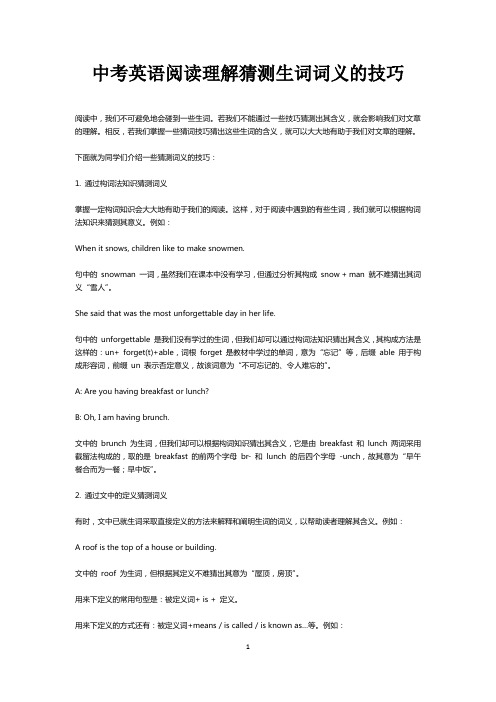
中考英语阅读理解猜测生词词义的技巧阅读中,我们不可避免地会碰到一些生词。
若我们不能通过一些技巧猜测出其含义,就会影响我们对文章的理解。
相反,若我们掌握一些猜词技巧猜出这些生词的含义,就可以大大地有助于我们对文章的理解。
下面就为同学们介绍一些猜测词义的技巧:1. 通过构词法知识猜测词义掌握一定构词知识会大大地有助于我们的阅读。
这样,对于阅读中遇到的有些生词,我们就可以根据构词法知识来猜测其意义。
例如:When it snows, children like to make snowmen.句中的snowman 一词,虽然我们在课本中没有学习,但通过分析其构成snow + man 就不难猜出其词义“雪人”。
She said that was the most unforgettable day in her life.句中的unforgettable 是我们没有学过的生词,但我们却可以通过构词法知识猜出其含义,其构成方法是这样的:un+ forget(t)+able,词根forget 是教材中学过的单词,意为“忘记”等,后缀able 用于构成形容词,前缀un 表示否定意义,故该词意为“不可忘记的、令人难忘的”。
A: Are you having breakfast or lunch?B: Oh, I am having brunch.文中的brunch 为生词,但我们却可以根据构词知识猜出其含义,它是由breakfast 和lunch 两词采用截留法构成的,取的是breakfast 的前两个字母br- 和lunch 的后四个字母-unch,故其意为“早午餐合而为一餐;早中饭”。
2. 通过文中的定义猜测词义有时,文中已就生词采取直接定义的方法来解释和阐明生词的词义,以帮助读者理解其含义。
例如:A roof is the top of a house or building.文中的roof 为生词,但根据其定义不难猜出其意为“屋顶,房顶”。
中考英语阅读词义推测题答题技巧和方法

中考英语阅读词义推测题答题技巧和方法全文共10篇示例,供读者参考篇1Hi guys, today we are going to talk about some tips and tricks on how to answer inference questions in the Reading section of the middle school entrance exam ().So, what are inference questions? These are the questions where you have to figure out the meaning of a word or phrase based on the information given in the passage. It can be a bit tricky, but don't worry, we've got you covered!First of all, always read the passage carefully. Make sure you understand the main idea and the details before moving on to the questions. Pay attention to the tone and style of the passage as well, as it can help you understand the context better.When you come across an inference question, try to re-read the sentence or paragraph where the word or phrase is mentioned. Look for clues that can help you figure out the meaning. Sometimes, the answer can be found in the surrounding sentences.If you still can't figure out the meaning, try to think of synonyms or antonyms for the word or phrase. This can give you a hint about its meaning. You can also look for prefixes or suffixes that can help you break down the word into smaller parts.Don't forget to trust your instincts. If you have a gut feeling about the meaning of the word, go for it! Sometimes, your intuition can lead you to the right answer.Practice makes perfect, so make sure to do as many practice exercises as you can. This will help you improve your skills and boost your confidence in answering inference questions.Remember, inference questions are all about using your critical thinking skills and making educated guesses based on the information provided. So stay calm, stay focused, and you'll do just fine!Good luck on your middle school entrance exam, and happy reading!篇2Hey guys, do you know how to guess the meaning of a word or phrase when you're reading a passage in a test? Today, I'mgoing to tell you some tips and tricks on how to infer the meaning of words or phrases in a reading comprehension test.First of all, when you come across a word or phrase that you don't know, don't panic! Take a deep breath and look at the context. Sometimes, the words around the unknown word can give you a clue about its meaning. Try to think about what would make sense in that particular sentence.Secondly, pay attention to any clues that the author gives you. For example, the author might use a synonym or give a definition of the word in the text. This can help you understand the meaning of the word in question.Thirdly, think about the root of the word. Many English words come from Latin or Greek roots, so knowing the meaning of the root can help you figure out the meaning of the word. For example, the root "tele" means distant, so words like "television" or "telephone" have to do with communicating over a distance.Lastly, don't forget to use your common sense and background knowledge. If you know a little bit about the topic of the text, you can make an educated guess about the meaning of a word based on that knowledge.In conclusion, when you're trying to figure out the meaning of a word or phrase in a reading comprehension test, it's important to stay calm, look at the context, pay attention to clues, think about the root of the word, and use your common sense. With a little bit of practice, you'll become a pro at inferring the meaning of words in no time. Good luck on your next reading comprehension test!篇3Hey guys, do you sometimes feel puzzled when you have to answer those tricky "inference" questions in your English reading test? Don't worry, I'm here to help you out! In this article, I'll give you some tips and tricks on how to tackle reading comprehension questions that ask you to make logical guesses based on the information given in the passage.First of all, it's important to carefully read the passage and understand its main idea. Pay attention to the details and try to connect the dots between different pieces of information. This will help you get a better grasp of the overall meaning of the passage and make it easier to make educated guesses.Next, look out for clues in the text that can help you make logical inferences. These clues can be explicit, like directstatements or descriptions, or implicit, like hints or suggestions. By identifying these clues, you can better understand the author's intentions and make accurate guesses about the text.Another important tip is to think critically and use your reasoning skills. Don't just rely on the information explicitly stated in the passage, but also think about what makes sense in the context of the text. Consider the author's tone, purpose, and perspective to help you infer the meaning behind the words.Remember to eliminate any answer choices that are clearly incorrect or irrelevant. Sometimes, just by process of elimination, you can narrow down your choices and increase your chances of selecting the correct answer.Lastly, practice, practice, practice! The more you practice reading comprehension and inference questions, the better you'll get at making logical guesses and understanding the deeper meaning of the text.So there you have it, guys! By following these tips and practicing regularly, you'll be a pro at answering inference questions in no time. Good luck on your next reading test!篇4Hey guys! Do you know how to answer the inference questions in the English reading comprehension test? Let me give you some tips and tricks on how to tackle these questions like a pro!First of all, inference questions are where you have to use the information given in the text to figure out the correct answer. It's like being a detective and solving a mystery! So pay close attention to the details in the passage.One key tip is to look for clues in the text that can help you make educated guesses about the answer. These clues can be in the form of words like "because", "therefore", or "since". They help connect the dots between different parts of the passage.Also, think about the author's purpose and tone. Are they trying to inform, persuade, or entertain? This can help you understand the underlying message of the text and make better inferences.Another important thing to remember is to trust your intuition. Sometimes, your gut feeling can lead you to the right answer. Just make sure to explain why you think that's the correct choice based on the information in the passage.And last but not least, practice makes perfect! The more you practice answering inference questions, the better you'll get at identifying the right clues and making accurate guesses.So next time you're faced with an inference question in the English reading test, remember to pay attention to the details, look for clues, consider the author's purpose, trust your intuition, and practice, practice, practice! Good luck, and happy reading!篇5Hello everyone, today I am going to talk about some tips and methods for guessing the meaning of words in English reading comprehension tests. It can be a little tricky sometimes, but don't worry, I'll help you out!First of all, when you come across a word you don't know, don't panic! Take a deep breath and try to think about the context of the sentence. Look at the surrounding words and try to figure out what the word might mean based on how it is used in the sentence.Secondly, you can look for clues in the text to help you guess the meaning of a word. Sometimes, the author will give you hints about what a word means by providing synonyms, definitions, oreven examples in the text. Pay attention to these clues and use them to help you figure out the meaning of the word.Another tip is to break down the word into smaller parts. Many English words are made up of prefixes, roots, and suffixes, which can give you clues about the meaning of the word. If you can figure out the meanings of these smaller parts, it can help you understand the overall meaning of the word.Lastly, if you are still unsure about the meaning of a word, try looking it up in a dictionary. This can be a helpful way to confirm your guess and learn more about the word's meaning. Don't be afraid to ask for help from a teacher or classmate if you are struggling to understand a word.In conclusion, guessing the meaning of words in English reading comprehension tests can be challenging, but with practice and these tips, you can improve your skills and become a better reader. Remember to stay calm, look for clues, break down the word, and don't be afraid to ask for help. Good luck with your reading comprehension tests!篇6Title: Tips and Tricks for Guessing the Meaning in Reading ComprehensionHey guys, today we are going to talk about a super important skill in English – guessing the meaning of words in reading comprehension! Sometimes when we are reading a passage, we may come across words that we don't know the meaning of. But don't worry, there are some tricks that can help us figure out the meaning without looking it up in the dictionary.First of all, when we don't know a word, we can try to look at the surrounding words to see if they give us any clues. For example, if we see the word "feline," we can take a look at the sentence and see if it mentions things like "purr," "whiskers," or "cat." These words are related to cats, so we can guess that "feline" might mean something to do with cats.Secondly, we can also look at the root of the word. Many English words come from Latin or Greek roots, and if we know the root, we can often guess the meaning. For example, the word "hydrophobia" has the root "hydro," which means water. So, we can guess that "hydrophobia" might mean fear of water.Another tip is to think about the context of the passage. Sometimes, even if we don't know the exact meaning of a word, we can still understand what is happening in the passage. For example, if we read a sentence like "The astronaut was elated ashe stepped onto the moon," we can guess that "elated" means happy or excited from the context.Lastly, if all else fails, we can try to visualize the word. Close your eyes and try to picture what the word might mean based on the sounds it makes. Sometimes, this can help us come up with a close guess.So remember, if you come across a word you don't know while reading a passage, don't panic! Use these tips and tricks to help you guess the meaning. Happy reading!篇7Hey guys, today I wanna talk about some tips on how to guess the meaning of a passage in the reading comprehension part of the middle school entrance exam. It can be pretty tricky sometimes, but no worries, I've got you covered!First things first, read the whole passage carefully. Try to understand the main idea of the text. Look for keywords or phrases that stand out to you.If there are any words you don't know, try to guess the meaning based on the context. Look for clues in the surroundingsentences or paragraph. Sometimes the author will give you hints to help you figure it out.Another tip is to look for synonyms or antonyms in the passage. If you see a word that you don't understand, maybe there's a similar word nearby that can help you figure it out.Pay attention to prefixes and suffixes. They can give you clues about the meaning of a word. For example, if you see the prefix "un-" before a word, you can guess that it means "not" or "opposite".Lastly, use your common sense and logic. If you can't figure out the exact meaning of a word, try to think about what would make sense in the context of the passage.Remember, practice makes perfect! The more you read and practice, the better you'll get at guessing the meaning of unfamiliar words in a passage.Good luck with your exams, you've got this!篇8Hey guys, do you have trouble with reading comprehension in the middle school entrance exam? Don't worry, I've got some tips and tricks to help you out!First of all, when you're reading a passage, try to understand the main idea. Look for keywords that can help you figure out what the passage is about. If you're not sure, read the first and last paragraphs for a summary.Secondly, pay attention to details in the passage. Look for specific information that can help you answer the questions later on. Take notes or underline important points to help you remember.Next, when you're answering the questions, look for clues in the passage. Sometimes the answer is right there in the text, so make sure to go back and re-read if you're not sure.Also, be careful of answer choices that are too extreme or off-topic. Eliminate those options first and then choose the best answer based on the information in the passage.Lastly, practice, practice, practice! The more you read and answer questions, the better you'll get at it. Try to do a little bit every day to build up your skills.So, don't stress about the reading section of the exam. Just remember these tips and you'll be ready to tackle any passage that comes your way. Good luck!篇9Hey guys!Today, let's talk about a super important skill for the English exam, which is guessing the meaning of a word from the context! This skill is called "inferencing", and it's super helpful when you come across a word you don't know during the reading comprehension part of the test.So, how do we do this? Well, first things first, read the sentence the word is in carefully. Look for clues about what the word might mean. Sometimes, the sentence itself will give you a hint.Next, look at the words around the tricky word. Do any of them give you a clue? Sometimes, words that are similar to the tricky word can help you figure out what it means.Another thing you can do is think about the overall meaning of the paragraph or passage. Does the word fit with the rest of the text? If it does, it can help you figure out what the word means.If all else fails, try to break the word down into smaller parts. Maybe you know what one part of the word means, which can help you figure out the whole thing.Remember, it's okay to guess! Sometimes, you won't know the exact meaning of a word, but you can make an educated guess based on the context.So, keep practicing this skill, guys! It'll definitely come in handy during the exam. Good luck!篇10Hello everyone! Today, I'm gonna tell you some cool tips and tricks for answering inference questions in the Reading section of the middle school entrance exam.First things first, what are inference questions? These tricky little buggers ask you to figure out the meaning of the text by using clues from the passage. It's like being a detective, trying to piece together information to solve a mystery!So, how do you tackle these questions? Well, here are some tips to help you out:1. Pay attention to details: Sometimes, the answer to an inference question is hidden in the smallest details of the passage. Look for words or phrases that might give you a hint about what's going on.2. Look for clues: The author of the passage may not come right out and say something directly. Instead, they might hint at it through the use of descriptive language or by providing examples. Keep an eye out for these clues to help you understand the text better.3. Use your own knowledge: Sometimes, you'll need to use your own background knowledge to make an inference. If the passage mentions something you already know about, use that information to help you make connections and draw conclusions.4. Eliminate wrong answers: If you can't figure out the answer right away, try eliminating the options that are obviously wrong. This can help you narrow down your choices and improve your chances of selecting the correct answer.Remember, practice makes perfect! So, go ahead and try out these tips on some practice passages. The more you practice, the better you'll get at answering inference questions. Good luck and happy reading!。
初中英语阅读理解中的词义猜测技巧

初中英语阅读理解中的词义猜测技巧在初中英语学习中,阅读理解是一个重要的部分,而词义猜测则是阅读理解中的一项关键技能。
当我们遇到不熟悉的单词或短语时,如果能够准确地猜测出它们的意思,将有助于我们更好地理解整篇文章。
下面,我将为大家介绍一些在初中英语阅读理解中实用的词义猜测技巧。
一、通过上下文语境猜测词义上下文语境是猜测词义最常用也是最有效的方法之一。
我们可以通过阅读单词或短语所在的句子以及前后的句子,来获取相关的线索。
例如,如果一个句子中提到“John was so hungry that he devoured the entire pizza in minutes” 在这里,我们不认识“devoured”这个词,但通过前面提到“John 很饿”以及后面“整个披萨在几分钟内”,可以猜测“devoured”是“狼吞虎咽地吃”的意思。
再比如,“The weather was extremely hot, and people sought refuge in the shade” 从“天气非常热”以及“在阴凉处”,可以推断出“sought refuge”大概是“寻找庇护、躲避”的意思。
二、利用定义、解释或同位语猜测词义有些文章会直接对生词进行定义、解释或者通过同位语来帮助读者理解词义。
比如,“A thermometer is an instrument used to measure temperature” 很明显,通过“is an instrument used to measure temperature”(是一种用来测量温度的仪器),我们能明白“thermometer”是“温度计”的意思。
又或者,“My sister, Mary, who is a doctor, always works very hard” 这里“who is a doctor”就是对“Mary”的同位语解释,让我们知道 Mary 的职业是医生。
中考英语阅读理解 猜词题 解题技巧
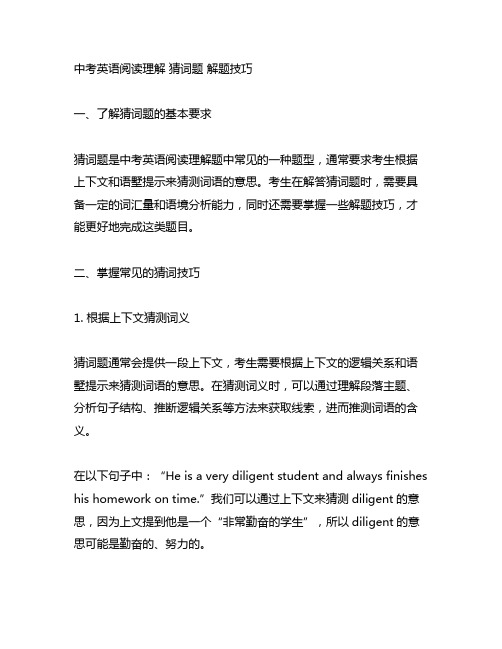
中考英语阅读理解猜词题解题技巧一、了解猜词题的基本要求猜词题是中考英语阅读理解题中常见的一种题型,通常要求考生根据上下文和语墅提示来猜测词语的意思。
考生在解答猜词题时,需要具备一定的词汇量和语境分析能力,同时还需要掌握一些解题技巧,才能更好地完成这类题目。
二、掌握常见的猜词技巧1. 根据上下文猜测词义猜词题通常会提供一段上下文,考生需要根据上下文的逻辑关系和语墅提示来猜测词语的意思。
在猜测词义时,可以通过理解段落主题、分析句子结构、推断逻辑关系等方法来获取线索,进而推测词语的含义。
在以下句子中:“He is a very diligent student and always finishes his homework on time.”我们可以通过上下文来猜测diligent的意思,因为上文提到他是一个“非常勤奋的学生”,所以diligent的意思可能是勤奋的、努力的。
2. 利用语境提示进行词义推断除了根据上下文猜测词义外,还可以利用语境提示进行词义推断。
比如一些词语的前后文会提供一些提示性的词语,这些提示性词语往往可以帮助我们推测目标词语的意思。
在以下句子中:“W hen the teacher asked a difficult question, the students looked puzzled.”我们可以通过后面的“looked puzzled”来推测difficult的意思,因为学生们显然是对这个问题感到困惑。
3. 掌握常见词义辨析技巧在解答猜词题时,有些词语的词义可能会让考生感到困惑,这时就需要掌握一些词义辨析技巧。
比如通过对比近义词或反义词的意思,来推测目标词语的含义。
在以下句子中:“The music was so loud that it was almost deafening.”我们可以通过对比loud和deafening的意思,来推测deafening的含义,因为loud表示“大声的”,而deafening应该表示“震耳欲聋的”。
最新中考英语复习阅读理解技巧之猜测词义答题策略

中考英语复习阅读理解技巧之猜测词义答题策略英语阅读中,我们常常会遇到一些不认识的单词或短语,或者认识的单词短语在文章中被赋予了新意义和解释。
当这些单词短语并不妨碍我们理解文章的主要内容时,我们通常可以忽略它们;但如果这些词或短语影响了我们对文章的理解,这就需要我们根据上下文来猜测它们在文中的意思了。
这种情况下,掌握猜词的技巧就显得尤为重要。
猜测词义可以在一定程度上考查学生的逻辑推断能力,也是考察阅读能力的一个重要部分,所以这种题目频繁出现在各种考试中。
在英语阅读中根据上下文猜测词义,有助于锻炼同学们分析问题、解决问题的能力,也有助于扩大词汇量。
通常,猜测词义可采用以下14种方法:一、根据转折关系:为了帮助学生更好地理解文章的中的句子之间的意思,通常会出现一些表示转折关系的词。
例如:though, although, but, however 等,通过这些连接词,使读者更加清楚地了解句子的含义。
例1:Any fool can make soap, but it takes a genius to sell it.由but可知genius是与fool(蠢才)相对的,由此推测其意为“有才能的人、天才”。
例2:A vegetarian doesn’t want meat, but may value bananas highly, while a meat-eater may prefer steak.句中vegetarian通过while与meat-eater对比,可猜为“吃素者”。
例3:Most of them agreed; however, John dissented.句中dissented通过however与agreed对比, dissented意思是“反对”。
二、根据对比关系:在一个句子或段落中,有对两个事物或现象进行对比性的描述,我们可以根据生词或难词的反义词猜测其词义。
表示对比关系的词汇和短语主要有:unlike, not, while, on the other hand, in spite of, in contrast等。
中考英语词义猜测题解题技巧
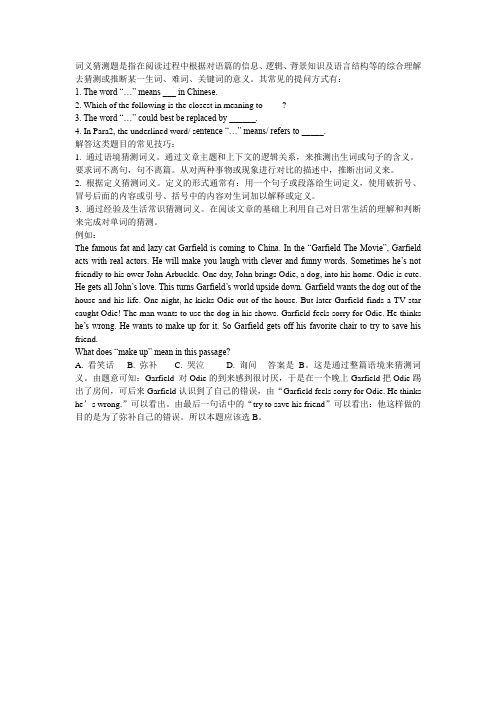
词义猜测题是指在阅读过程中根据对语篇的信息、逻辑、背景知识及语言结构等的综合理解去猜测或推断某一生词、难词、关键词的意义。
其常见的提问方式有:1. The word “…” means ___ in Chinese.2. Which of the following is the closest in meaning to ____?3. The word “…” could best be replaced by ______.4. In Para2, the underlined word/ s entence “…” means/ refers to _____.解答这类题目的常见技巧:1. 通过语境猜测词义。
通过文章主题和上下文的逻辑关系,来推测出生词或句子的含义。
要求词不离句,句不离篇。
从对两种事物或现象进行对比的描述中,推断出词义来。
2. 根据定义猜测词义。
定义的形式通常有:用一个句子或段落给生词定义,使用破折号、冒号后面的内容或引号、括号中的内容对生词加以解释或定义。
3. 通过经验及生活常识猜测词义。
在阅读文章的基础上利用自己对日常生活的理解和判断来完成对单词的猜测。
例如:T he famous fat and lazy cat Garfield is coming to China. In the “Garfield The Movie”, Garfield acts with real actors. He will make you laugh with clever and funny words. Sometimes he’s not friendly to his ower John Arbuckle. One day, John brings Odie, a dog, into his home. Odie is cute. He gets all John’s love. This turns Garfield’s world upside down. Garfield wants the dog out of the house and his life. One night, he kicks Odie out of the house. But later Garfield finds a TV star caught Odie! The man wants to use the dog in his shows. Garfield feels sorry for Odie. He thinks he’s wrong. He wants to make up for it. So Garfield gets off his favorite chair to try to save his friend.What does “make up” mean in this passage?A. 看笑话B. 弥补C. 哭泣D. 询问答案是B。
中考英语阅读理解之猜词答题技巧(含相应练习)

中考阅读理解之猜词解题技巧(含相应练习)中英语阅读占的比重很大,在阅读的时候,学生往往会遇到一些生词,影响我们的阅读速度,其实大部分生词的意思都可以通过上下文的关系猜出来,下面就介绍一些猜词的技巧。
总结:1定义法 2 举例法 3 对比法 4 因果法5 重述法6 生活经验7 构词法 8上下文语境一.中考英语对阅读理解的要求:1).能根据上下文和构词法推断、理解生词的含义。
2).能获取文章的具体信息。
3).能理解文章中的具体信息并进行简单的推理和判断。
4).能理解归纳文章的主旨要义,能为文章选定合适的题目。
5).能理解故事情节和事件发展顺序以及段落中各句子之间的逻辑关系。
6).能根据上下文理解作者的态度、观点及意图。
二.常见猜词题的设问方式:1. The underlined word is closest in meaning to the word…?2. We can learn from the underlined part… that…3. The underlined word “it” in paragraph… refers to …4. By saying…, the author means to say that…5. What does the underlined word “......” mean in Chinese?三.猜测词义的方法:1. Definition 定义法:一般通过定义、定语(从句)或同位语(从句)来确定词义。
信号词:be, means, refers to, be called, 定语从句The word “adolescence” means the period between children and adulthood.A 少儿期B 幼儿期C 青春期D 成人期The herdsman ,who looks after sheep, earns about 650 yuan a year.A person who is skilled at making or repairing wooden objects is called a carpenter.His uncle is a zoologist, an expert who does research on animals.We are on the night shift --- from midnight to 8 a.m. --- this week.2. 举例法:信号词: such as, like, for exampleOn the farm they mainly raise poultry, such as chickens, ducks and geese, for their eggs and meat. The word “poultry” means _____.A.猎物B.家禽C.饲料D.牲畜You can take any of the periodicals: Crazy English, Reader, Teaching in Schools, or English Learning.Today young couples often spend lots of their money on appliances, for instance, washing machines, refrigerators and color televisions.3. Contrast 对比法:利用文中的反义词以及表对比关系的词(组)猜测词义。
专题4.字词猜测解题技巧中考英语题型过关

字词猜测解题技巧根据上下文推断单词和短语的含义是英语阅读理解题重要出题方向之一,也是考查考生英语语言能力和文化品格的一种重要方式。
词义猜测题可以针对单词、短语的意思进行命题考查,还可以针对某一句子的准确理解或代词的精确指代进行设题。
除了直接考查单词或短语词义猜测外,在阅读理解文章中,总会有一些单词或短语超出了《考试大纲》词汇表的范围,但又没有附加注释,也需要考生猜测,这也是对词义猜测的一种间接考查。
方法1 词义猜测法词义猜测指通过构词、定义、对比、因果、常识、同义、反义及语境等确定词义。
通常包括生词释义、熟词新义。
考查学生联系主旨、结合上下文对词汇的理解辨别能力。
A woman bought a parrot from a pet store. However, the woman decided to return the parrot to the shop the next day."This bird doesn't talk," she told the pet shop owner."Does he have a mirror in his cage (笼子)?" the owner asked. "Parrots love mirrors."The woman bought a mirror and left. The next day she came back, saying that the bird still wasn't talking.The underlined word "parrot" in paragraph 1 means "______" in Chinese.D. 老鹰Step1:分析理解词汇所在句的含义:一位女士从宠物店买了一只......。
中考英语阅读理解题答题方法
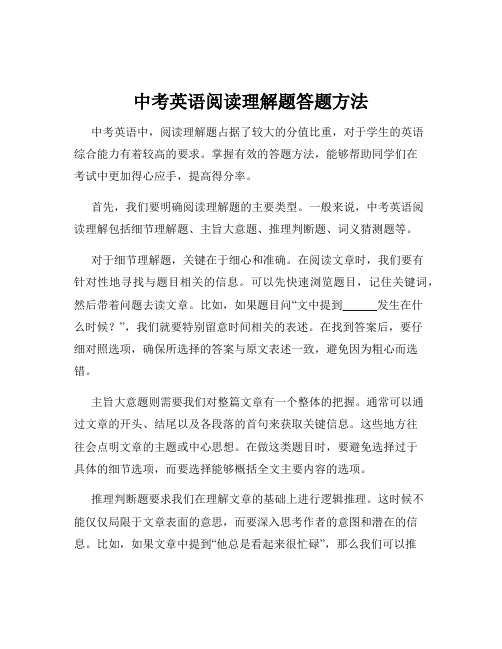
中考英语阅读理解题答题方法中考英语中,阅读理解题占据了较大的分值比重,对于学生的英语综合能力有着较高的要求。
掌握有效的答题方法,能够帮助同学们在考试中更加得心应手,提高得分率。
首先,我们要明确阅读理解题的主要类型。
一般来说,中考英语阅读理解包括细节理解题、主旨大意题、推理判断题、词义猜测题等。
对于细节理解题,关键在于细心和准确。
在阅读文章时,我们要有针对性地寻找与题目相关的信息。
可以先快速浏览题目,记住关键词,然后带着问题去读文章。
比如,如果题目问“文中提到______发生在什么时候?”,我们就要特别留意时间相关的表述。
在找到答案后,要仔细对照选项,确保所选择的答案与原文表述一致,避免因为粗心而选错。
主旨大意题则需要我们对整篇文章有一个整体的把握。
通常可以通过文章的开头、结尾以及各段落的首句来获取关键信息。
这些地方往往会点明文章的主题或中心思想。
在做这类题目时,要避免选择过于具体的细节选项,而要选择能够概括全文主要内容的选项。
推理判断题要求我们在理解文章的基础上进行逻辑推理。
这时候不能仅仅局限于文章表面的意思,而要深入思考作者的意图和潜在的信息。
比如,如果文章中提到“他总是看起来很忙碌”,那么我们可以推理出“他可能没有太多的空闲时间”。
但要注意,推理必须基于文章所提供的内容,不能凭空想象或过度推测。
词义猜测题考查的是我们根据上下文理解生词的能力。
当遇到不认识的单词时,不要慌张,可以通过前后的句子、段落来推测其大致意思。
比如,如果文中说“他是一个吝啬鬼,从不愿意花钱”,那么我们可以猜测“吝啬鬼”这个词表示“小气、不舍得花钱的人”。
接下来,说一说阅读技巧。
在阅读文章时,要学会快速浏览,抓住关键信息。
不必逐字逐句地读,对于一些不重要的细节可以略过。
同时,要注意文章中的转折词、连接词等,如 but、however、therefore 等,这些词往往能够帮助我们理解文章的逻辑关系。
另外,做好阅读理解题还需要有一定的词汇量和语法知识。
中考英语阅读理解词义猜测技巧-最新教育文档
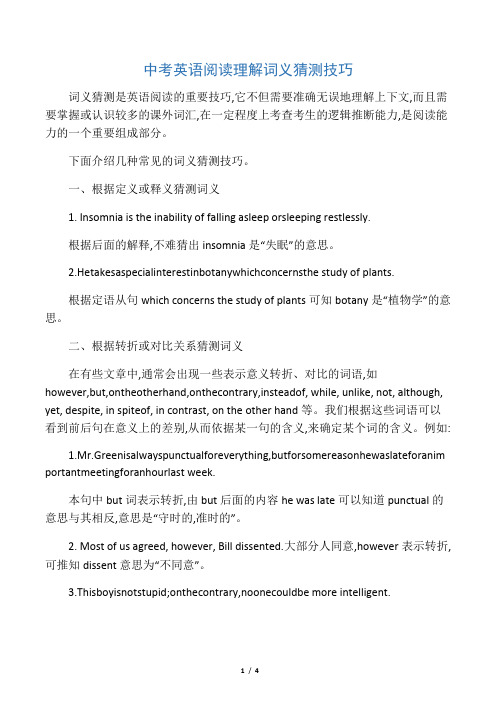
中考英语阅读理解词义猜测技巧词义猜测是英语阅读的重要技巧,它不但需要准确无误地理解上下文,而且需要掌握或认识较多的课外词汇,在一定程度上考查考生的逻辑推断能力,是阅读能力的一个重要组成部分。
下面介绍几种常见的词义猜测技巧。
一、根据定义或释义猜测词义1. Insomnia is the inability of falling asleep orsleeping restlessly.根据后面的解释,不难猜出insomnia是“失眠”的意思。
2.Hetakesaspecialinterestinbotanywhichconcernsthe study of plants.根据定语从句which concerns the study of plants可知botany是“植物学”的意思。
二、根据转折或对比关系猜测词义在有些文章中,通常会出现一些表示意义转折、对比的词语,如however,but,ontheotherhand,onthecontrary,insteadof, while, unlike, not, although, yet, despite, in spiteof, in contrast, on the other hand等。
我们根据这些词语可以看到前后句在意义上的差别,从而依据某一句的含义,来确定某个词的含义。
例如:1.Mr.Greenisalwayspunctualforeverything,butforsomereasonhewaslateforanim portantmeetingforanhourlast week.本句中but词表示转折,由but后面的内容he was late可以知道punctual的意思与其相反,意思是“守时的,准时的”。
2. Most of us agreed, however, Bill dissented.大部分人同意,however表示转折,可推知dissent意思为“不同意”。
中考英语 阅读理解 猜测词义题解题指导
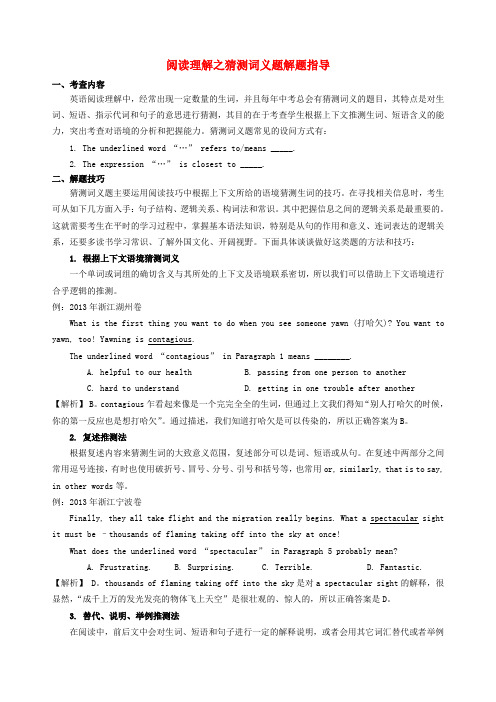
阅读理解之猜测词义题解题指导一、考查内容英语阅读理解中,经常出现一定数量的生词,并且每年中考总会有猜测词义的题目,其特点是对生词、短语、指示代词和句子的意思进行猜测,其目的在于考查学生根据上下文推测生词、短语含义的能力,突出考查对语境的分析和把握能力。
猜测词义题常见的设问方式有:1. The underlined word “…” refers to/means _____.2. The expression “…” is closest to _____.二、解题技巧猜测词义题主要运用阅读技巧中根据上下文所给的语境猜测生词的技巧。
在寻找相关信息时,考生可从如下几方面入手:句子结构、逻辑关系、构词法和常识。
其中把握信息之间的逻辑关系是最重要的。
这就需要考生在平时的学习过程中,掌握基本语法知识,特别是从句的作用和意义、连词表达的逻辑关系,还要多读书学习常识、了解外国文化、开阔视野。
下面具体谈谈做好这类题的方法和技巧:1. 根据上下文语境猜测词义一个单词或词组的确切含义与其所处的上下文及语境联系密切,所以我们可以借助上下文语境进行合乎逻辑的推测。
例:2013年浙江湖州卷What is the first thing you want to do when you see someone yawn (打哈欠)? You want to yawn, too! Yawning is contagious.The underlined word “contagious” in Paragraph 1 means ________.A. helpful to our healthB. passing from one person to anotherC. hard to understandD. getting in one trouble after another【解析】 B。
contagious乍看起来像是一个完完全全的生词,但通过上文我们得知“别人打哈欠的时候,你的第一反应也是想打哈欠”。
(完整word版)中考英语阅读理解猜测词义题答题策略
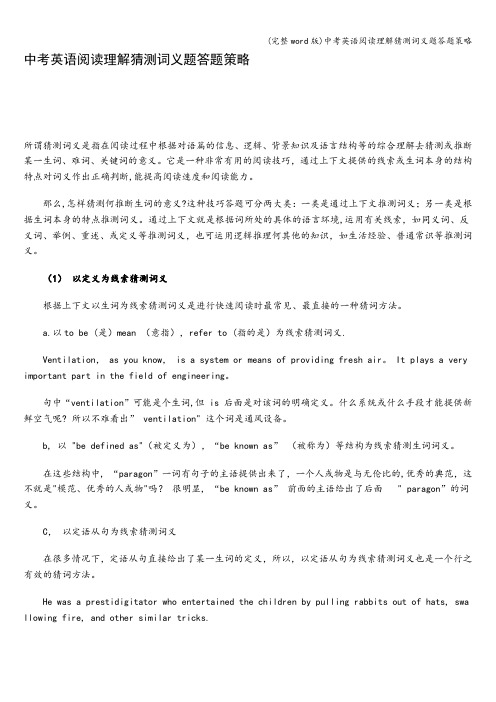
中考英语阅读理解猜测词义题答题策略所谓猜测词义是指在阅读过程中根据对语篇的信息、逻辑、背景知识及语言结构等的综合理解去猜测或推断某一生词、难词、关键词的意义。
它是一种非常有用的阅读技巧,通过上下文提供的线索或生词本身的结构特点对词义作出正确判断,能提高阅读速度和阅读能力。
那么,怎样猜测何推断生词的意义?这种技巧答题可分两大类:一类是通过上下文推测词义;另一类是根据生词本身的特点推测词义。
通过上下文就是根据词所处的具体的语言环境,运用有关线索,如同义词、反义词、举例、重述、或定义等推测词义,也可运用逻辑推理何其他的知识,如生活经验、普通常识等推测词义。
(1)以定义为线索猜测词义根据上下文以生词为线索猜测词义是进行快速阅读时最常见、最直接的一种猜词方法。
a.以to be (是)mean (意指),refer to (指的是)为线索猜测词义.Ventilation, as you know, is a system or means of providing fresh air。
It plays a very important part in the field of engineering。
句中“ventilation”可能是个生词,但 is 后面是对该词的明确定义。
什么系统或什么手段才能提供新鲜空气呢? 所以不难看出” ventilation" 这个词是通风设备。
b, 以 "be defined as"(被定义为),“be known as” (被称为)等结构为线索猜测生词词义。
在这些结构中, “paragon”一词有句子的主语提供出来了,一个人或物是与无伦比的,优秀的典范,这不就是"模范、优秀的人或物"吗?很明显, “be known as” 前面的主语给出了后面" paragon”的词义。
C,以定语从句为线索猜测词义在很多情况下,定语从句直接给出了某一生词的定义,所以,以定语从句为线索猜测词义也是一个行之有效的猜词方法。
初三英语阅读理解技巧词义猜测题的解题技巧

初三英语阅读理解技巧词义猜测题的解题技巧初三英语阅读理解技巧:词义猜测题的解题技巧在初三英语的学习中,阅读理解是一个重要的部分,而词义猜测题则是阅读理解中的常见题型。
对于很多同学来说,这类题目可能具有一定的挑战性,但只要掌握了正确的解题技巧,就能轻松应对。
接下来,我将为大家详细介绍初三英语阅读理解中词义猜测题的解题技巧。
一、通过上下文语境猜测词义上下文语境是猜测词义最常用也是最有效的方法之一。
在阅读过程中,我们可以通过前后的句子、段落来推断生词的含义。
例如,如果生词前后出现了解释说明的语句,那么这些语句往往能帮助我们理解词义。
比如:“The term ‘ecosystem’ refers to a communityof living organisms and their environment ”在这个句子中,“refers to”后面的内容就是对“ecosystem”这个词的解释,即“生态系统是指生物群落及其环境”,从而我们可以理解“ecosystem”的意思。
再比如,有时候上下文会通过对比、类比的方式来暗示生词的词义。
如果文中提到“A is different from B B is known as a kind of vehicle, whileA is a tool used for writing ”那么我们就可以推测出 A 可能是某种书写工具。
此外,上下文的逻辑关系也能为词义猜测提供线索。
比如因果关系、转折关系等。
如果文中说“Although he was very tired, he still insisted on working ”通过“although”所表示的转折关系,我们可以猜测“insisted on”可能有“坚持”的意思。
二、利用构词法猜测词义英语中有很多单词是通过构词法构成的,了解常见的构词法可以帮助我们猜测词义。
前缀和后缀是常见的构词元素。
比如“un”“dis”“in”等前缀通常表示否定;“ful”“less”“able”“ous”等后缀可以改变单词的词性和意思。
初三中考英语阅读理解专题之猜测词义解题技巧讲义教案(含练习答案)
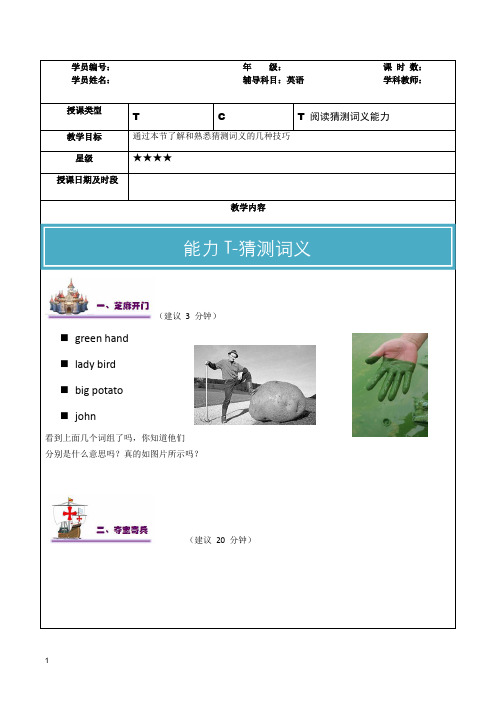
学员编号:年级:课时数:学员姓名:辅导科目:英语学科教师:授课类型T C T 阅读猜测词义能力教学目标通过本节了解和熟悉猜测词义的几种技巧星级★★★★授课日期及时段教学内容能力T-猜测词义(建议3 分钟)⏹green hand⏹lady bird⏹big potato⏹john看到上面几个词组了吗,你知道他们分别是什么意思吗?真的如图片所示吗?(建议20 分钟)巧猜词义技巧大突破一、考察形式猜测词义的能力属于英语的基本能力之一。
具体到考试题型上,在单项选择、完型填空、首字母填空、阅读理解等题型上都会有体现,尤其是阅读类题目,对陌生单词意思的猜测和对熟词生义的理解都是会直接影响到对文章的理解。
阅读理解题型往往会以如下形式进行考察。
1.What does the word “…” refer to?2.The underlin ed word “…” is the closest in meaning to ______.3.By saying that“…”, the author means that ___.看到这样的题目,就知道,若是不能理解所指单词意思,那就是失分喽!二、猜词方法大突破前面一开始我们猜测了几个单词的意思,现在我们在有上下文语境的情况下,你猜的对不对。
⏹On the way to the factory, Jack sang a pop song happily. Because it is the first day for him to work,When he was working, he talked with his comrade. Suddenly, the machine broke down because of his carelessness. Jack was afraid of the blame of his boss. His comrade told him, “Take it easy, you are a green hand.”⏹Do you like a lady bird? It is not a kind of bird. It is a insect(昆虫). It can fly. Its wings are red. It is verysmall.⏹Tom is a great man. Tom is treated as a big potato.⏹Tim drank too much water last night, so he went to visit john twice.【讲解】一个完全陌生的单词,或者一个熟悉的单词怎么都看不出啥意思?为什么?缺乏上下文的语境,一个单词,尤其是在文章中出现的单词,其前后句子或单词在意义上和语法上都会与其相联系。
- 1、下载文档前请自行甄别文档内容的完整性,平台不提供额外的编辑、内容补充、找答案等附加服务。
- 2、"仅部分预览"的文档,不可在线预览部分如存在完整性等问题,可反馈申请退款(可完整预览的文档不适用该条件!)。
- 3、如文档侵犯您的权益,请联系客服反馈,我们会尽快为您处理(人工客服工作时间:9:00-18:30)。
中考英语阅读理解猜测词义题答题策略所谓猜测词义是指在阅读过程中根据对语篇的信息、逻辑、背景知识及语言结构等的综合理解去猜测或推断某一生词、难词、关键词的意义。
它是一种非常有用的阅读技巧,通过上下文提供的线索或生词本身的结构特点对词义作出正确判断,能提高阅读速度和阅读能力。
那么,怎样猜测何推断生词的意义?这种技巧答题可分两大类:一类是通过上下文推测词义;另一类是根据生词本身的特点推测词义。
通过上下文就是根据词所处的具体的语言环境,运用有关线索,如同义词、反义词、举例、重述、或定义等推测词义,也可运用逻辑推理何其他的知识,如生活经验、普通常识等推测词义。
(1)以定义为线索猜测词义根据上下文以生词为线索猜测词义是进行快速阅读时最常见、最直接的一种猜词方法。
a.以to be (是)mean (意指),refer to (指的是)为线索猜测词义。
Ventilation, as you know, is a system or means of providing fresh air. It plays a very important part in the field of engineering.句中“ventilation"可能是个生词,但is 后面是对该词的明确定义。
什么系统或什么手段才能提供新鲜空气呢?所以不难看出" ventilation" 这个词是通风设备。
b, 以"be defined as"(被定义为),“be known as" (被称为)等结构为线索猜测生词词义。
在这些结构中,“paragon"一词有句子的主语提供出来了,一个人或物是与无伦比的,优秀的典范,这不就是”模范、优秀的人或物”吗?很明显,“be known as" 前面的主语给出了后面" paragon"的词义。
C, 以定语从句为线索猜测词义在很多情况下,定语从句直接给出了某一生词的定义,所以,以定语从句为线索猜测词义也是一个行之有效的猜词方法。
He was a prestidigitator who entertained the children by pulling rabbits out of hats, swallowing fire, and other similar tricks.此句中,who 引导的定语从句对生词" prestidigitator" 给出了非常清楚的定义或解释,根据这一定义,读者不难猜出presitidigitator 的词义。
能从帽子里拉出兔子、吞火何玩其他类似的把戏的人不就是变戏法的人吗?因此,“prestidigitator" 一词的词义就应是”变戏法者”D,以标点符号为线索猜测词义。
作者有时利用标点符号,如括号、冒号、破折号等为一些生词直接提供定义或解释,这些符号无疑为读者理解或猜测生词词义提供了很好的线索。
Tornadoes (violent and destructive whirl wind normally occur on hot, humid ( a little wet )day, but not necessarily in the summer.此句中,“tornado" 和"humid" 两词的词义都在括号里被清楚地表述出来。
"tornado" 即一种非常剧烈的、破坏性很大的旋转的风。
很明显,这是“旋风,飓风”; " humid" 即有点儿湿,其词义很清楚是“潮湿的意思。
在这种情况下,利用括号作为猜词线索,一瞬间就能猜出起词义,阅读课继续进行,不会因生词而影响阅读速度。
(2)以同义词、近义词为线索猜测词义有时作者为了使他的意思表达得更清楚明白,通常用一个同义词或近义词来解释另一个比较难的词或关键词,这些同义词或近义词为读者推断生词词义提供了线索。
另外,有时作者在表达同一概念时喜欢用两个或更多的同义词或近义词,其中必定有读者所熟悉的词,根据已知的词语,就不难推断出生词的词义。
or 有时课作为识别同义词或近义词的信号词。
The new tax law supersedes, or replaces, the law that was in effect last year.此句中,作者考虑到“supersede"一词可能是生词,紧接着用or 引出该词的同义词"replace". 读者课根据replace 一词的词义很容易推断出"supersede" 一词的大概意思来,即“取代,接替”。
b, like (像....一样),as....as(如同....一样),the same as (与...相同)等也可以作为识别生词的同义词或近义词的信号词,以这些词为线索,有时也可以推断出生词的词义。
Mother was tall, fat and middle-aged. The principle of the school was an older woman, almost as plump as mother, and much shorter.此句中,作者把学校的校长何母亲相比,有相同之处和不同之处。
校长比母亲年纪大,个子矮些,但有一点是相同的,用"as...as" 结构表示出来。
从这一对比中,可以看出fat 和plump 是近义词,即“肥胖的”那么,plump 一词的意思就能猜出个大概了。
(3)以反义词和对比关系为线索猜测词义。
有时作者运用对比的手法来表现事物之间的差异。
在进行对比的过程中,作者必然会用一些互为反义的词语使不同事物的特点更为突出。
通过上下文的逻辑关系,从对两种事物或现象进行对比的描述中,读者可以根据其中一个熟悉的词推断出另一个生词的词义。
另外,在表示这种关系时,作者通常会用一些信号词来表明另一个词语与前面词语互为反义,这些信号词无疑为读者理解和猜测生词词义提供了非常好的线索。
常用来表示对应关系和提供相反信息的信号词有,but, yet, however, while, whereas, otherwise, in spite of , despite, even though, although, thought, unlike, unstead (of), rather than, nevertheless, on the other hand, still, by contrast, on the contrary, in the end, compared to 等。
In the past the world seemed to run in an orderly way. Now, however, everthing seems to be in a state of turmoil.此句中,以信号词however 为线索,可以看出作者把现在的事情与过去进行对比。
过去是“in an orderly way" 而现在是”in a state of turmoil",过去是秩序井然,现在则是相反,那就是一片混乱。
(4),以列举的句子为线索猜测词义为了阐明某一种重要观念或讲清某一抽象概念,作者往往采取举例的方式对这一观点或概念进行具体的说明何解释,从而使读者理解得更具体。
那么文中的例子自然也就成了读者理解文章生词的线索。
表示列举关系的信号词有like, for example, for instance, such as, especially, indluce, consist of, specially 等。
Defined most broadly, folklore includes all the customs, belief and tradition that people have handed down from generation to generation.此句中,includes 后面的例子基本上表示出了"folklore"的内容范围,即人们一代传一代的那些风俗习惯、信仰何传统的东西。
这些东西都属于通常所说的“名俗学,民俗传统的东西。
这也就是"folklore"一词的基本含义。
(5)以重述为线索猜测词义有时作者在阐述某个概念或某一事情时,为了把它讲述得更清楚,他可能采取另一种方式重述一下前面的内容。
这种重述往往比前面表达更为简单易懂的词语。
后面这种简单易懂的词语无疑为前面较难的词语提供了猜测的线索。
因此,读者在阅读的过程中如遇到生词时,不要停下来,不妨看一下该生词后面是否有另一种阐述或解释。
表达重述,作者也经常使用一些信号词,这些信号词有in other words, that is to say, or that is, i.e. to be precise 等。
Before the main business of a conference begins the chairman usually makes a short preliminary (i.eintroductory) speech, or make a few preliminary remarks. In orther words, he says a few things by way of introduction.阅读此句时,如果对preliminary speech 的意思是在开会之前主席所做的一些简单的介绍,或者说是“开场白”。
(6)以因果关系为线索猜测词义因果关系是一种常见的、行之有效的、能提供生词词义信息的逻辑关系。
一定的原因会导致一定的结果:某一结果是由某种原因所引起的。
作者在叙述原因的过程中,必然会把词或句子置于一种因果关系的逻辑之中,这无疑为读者推断生词词义提供了很好的线索。
作者通常会用一些信号词表示句子之间的因果关系,这些信号词有since, as, because, for,so, thus, consequently, therefore, hence, due to, result from, as a result, for this reason, accordingly, so that, so... that, such...that 等。
Since I could not afford to purchase the original painting, I bought a replica. An inexperienced eye could tell the diffference.从信号词since 以及相关信息,可以看出生词所处的上下文存在很明显的因果关系。
